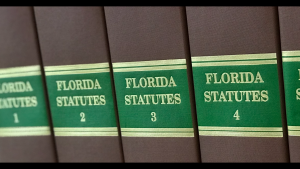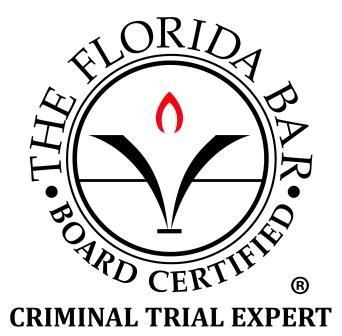In Florida, What’s the Difference Between a Withhold of Adjudication and an Adjudication of Guilt?
Posted by David C. Hardy on January 19, 2025
If you’ve been charged with a crime in the Florida state courts, it is important you understand the difference between a “withhold of adjudication” and an “adjudication of guilt.”
The distinction between these outcomes is crucial, as in some cases an adjudication of guilt can significantly impact your future.
What is a Withhold of Adjudication?

The Florida Statutes set out the rules for when a judge may adjudicate a defendant guilty and when a judge may withhold adjudication
Let’s say that the State of Florida charges you with a crime, and that you plead guilty, or no contest, or you are found guilty at a trial.
If, at your sentencing hearing, the judge announces that adjudication is withheld, then under Florida law you are not formally convicted of that crime. The judge could order you to go on probation and perform community service hours, but again, under Florida law, you are not convicted of any crime.
In 2016, the Florida Supreme Court wrote in the case of Clarke v. United States that the purpose of a withhold of adjudication is rehabilitative, and if the defendant completes his probation, he or she will not be a “convicted criminal.”
In other words, the purpose of a withhold is to give people who qualify a break, so that they can avoid the stigma of a criminal conviction. For example, if a person gets a withhold of adjudication in Florida, they can truthfully answer “no” if they are ever asked on a job application “have you ever been convicted of a crime?”
Does a Withhold of Adjudication Mean the Case is Dropped?
No. A withhold of adjudication does not mean that the criminal case is dropped. Each week in courtrooms across the State of Florida, judges withhold adjudication on defendants, and then those judges order the defendants to complete a term of probation, which can last months or even years. However, if the judge withholds adjudication and the defendant successfully completes probation, the Defendant will avoid a formal conviction.
What is an Adjudication of Guilt?
Let’s say that the State of Florida charges you with a crime, and that you plead guilty, or no contest, or you are found guilty at a trial.
If, at the sentencing hearing, the judge announces that he or she is adjudicating you guilty, then under Florida law, you have been formally convicted of that crime. When a person is convicted of a crime, there can be serious consequences (see below).
What are some of the Consequences of an Adjudication of Guilt?
There can be significant disadvantages when a Florida judge imposes an adjudication of guilt. For example:
If the judge imposes an adjudication of guilt on a felony charge, the person will lose his or her right to possess a firearm. If the judge withholds adjudication, the person will not lose his or her right to possess a firearm. If a person that has been adjudicated guilty of a felony does decide to carry a gun, they can be charged with felon in possession of a firearm.

If a Florida judge imposes an adjudication of guilt for a drug charge, the Florida DHSMV will suspend the defendant’s driver’s license for two years.
If the judge imposes an adjudication of guilt for possession of a controlled substance, even if it’s a misdemeanor possession of cannabis, the Florida Department of Highway Safety and Motor Vehicles will suspend that person’s driver’s license for two years. However, if the judge withholds adjudication on a controlled substances offense, there is no driver’s license suspension. If the judge imposes an adjudication of guilt on any criminal charge, even if it’s a misdemeanor, the person will never be able to have their record sealed or expunged. However, if the judge withholds adjudication, depending on the charge, the person may be able to seal or expunge. If the judge adjudicates a person guilty of any felony, or any misdemeanor crime of dishonesty (like petit theft) and that person appears as a witness in court in the future, an attorney can attack the credibility of the person with the fact that they have been adjudicated guilty.
The basic idea is that if a witness has been adjudicated guilty of a felony or a misdemeanor crime of dishonesty, that they are less likely to tell the truth in court, and a judge or jury may give their testimony less weight.
However, if a judge withholds adjudication on a felony or a misdemeanor crime of dishonesty, an attorney may not bring that withhold of adjudication up when that person testifies at a legal proceeding.
If the judge adjudicates a person guilty of reckless driving or leaving the scene of an accident with property damage, then the DHSMV will assess the person points on their driver’s license. However, if the judge withholds adjudication, no points are assessed.
How will the Judge Decide Whether or Not to Withhold Adjudication?

If a person is convicted of a domestic violence offense, Florida law requires that the judge impose an adjudication of guilt.
Under Florida law, if it appears to the judge that a defendant is unlikely to commit another crime, and the judge believes that “the ends of justice and the welfare of society do not require that the defendant suffer the penalty imposed by law” the judge may withhold adjudication.
In my experience, Florida judges order a withhold of adjudication when the offense qualifies for a withhold (see below) and the defendant has had little or no contact with the criminal justice system in the past.
As a practical matter, a judge may take the following factors into consideration when deciding whether to impose an adjudication of guilt:
Any injury suffered by a victim Any financial loss suffered by a victim The defendant’s prior criminal record Whether the defendant has taken responsibility for his or her actions Input from any victim The State Attorney’s position on the matter
Can a Florida Judge Withhold Adjudication on a Misdemeanor?

If a person pleads guilty or no contest to DUI, Florida law requires the judge to adjudicate that person guilty.
In some misdemeanor cases, like DUI or misdemeanor domestic violence battery, the judge has no choice – he or she must order an adjudication of guilt.
However, for most misdemeanors, the judge has the option of ordering a withhold of adjudication.
That’s one reason why experienced DUI attorneys will attempt to get their DUI clients’ charges reduced to reckless driving – because while a judge may not withhold adjudication on a DUI, they can withhold adjudication on a reckless driving.
Can a Florida Judge Withhold Adjudication on a Third-Degree Felony?
If the charge is a third-degree felony, most of the time judges have the option with withhold adjudication. There are exceptions to this, however. For example, if the charge involves domestic violence, or fleeing to elude, or felony DUI, then Florida law requires to judge to adjudicate the defendant guilty.
Can a Florida Judge Withhold Adjudication on a Second-Degree Felony?
If the case involves a second-degree felony, under Florida law, the judge cannot withhold adjudication, unless:
The state attorney requests in writing that adjudication be withheld; or The court makes written findings that the withholding of adjudication is reasonably justified.
Florida law does not permit a judge with withhold adjudication on a second-degree felony if a Defendant has a prior withhold of adjudication for a prior felony that was not related to the current felony offense.
Can a Florida Judge Withhold Adjudication on a First-Degree Felony?
If the case involves a capital, punishable by life, or first-degree felony, under Florida law, the judge cannot withhold adjudication.

Hiring an expert criminal defense attorney is key to getting the best possible outcome in your case. Attorney David C. Hardy is board certified by the Florida Bar and the National Board of Trial Advocacy as an expert in criminal trial law.
How a Skilled and Experienced Criminal Defense Attorney can Help
Navigating the criminal justice system can be overwhelming, but a skilled and experienced criminal defense attorney can advocate for a favorable resolution, such as a withhold of adjudication.
At The Hardy Law Firm, we have a deep understanding of Florida’s laws and a proven track record of helping clients achieve the best possible outcomes in their cases.
If you’re facing criminal charges in the Tampa Bay area, contact us today to schedule a consultation. Let us help you protect your rights and secure your future.
Posted in Florida Criminal Defense

David C. Hardy
David C. Hardy is a criminal defense attorney with offices in Tampa, Florida. He is a former prosecutor that is Board Certified by the Florida Bar and The National Board of Trial advocacy as an expert in criminal trial law. He practices in the areas of federal criminal defense, Florida criminal defense, and Florida DUI defense.
